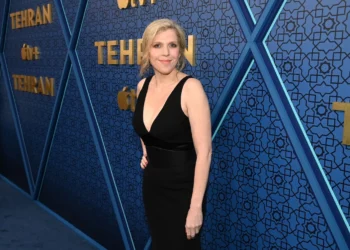Danish Renzu’s musical narrative, Songs of Paradise, is currently accessible on Amazon Prime Video.
This unconventional and engaging film, brought to life by the producers Farhan Akhtar and Ritesh Sidhwani, features Saba Azad and Soni Razdan in pivotal roles. It serves as a moving tribute to music, women, and the spirit of artistic aspiration, characterized by its poetic storytelling, strong performances, and visually captivating cinematography.
Story
Primarily unfolding through flashbacks and set in 1954 Srinagar, the movie draws inspiration from the late Raj Begum, famously known as Kashmir’s Melody Queen. Saba Azad portrays Zeba, the pioneering female vocalist of Kashmir, who defied societal constraints to pursue her artistic aspirations, with Soni Razdan appearing as her elder self. Zain Khan Durrani embodies her husband, Azaad, and Shishir Sharma takes on the role of her music mentor.
Performances & Behind the scenes
Despite occasional narrative weaknesses, Songs of Paradise radiates warmth and beauty, making it a consistently enjoyable viewing experience. Azad and Razdan are perfectly suited for their author-driven characters, impressing with their skillful portrayal and authentic command of the Urdu language. Azad, in particular, shines in this Kashmir-centric story, allowing her artistic talents to flourish. Her natural, timeless beauty complements the role perfectly, and the film’s period-appropriate aesthetics, including stunning cinematography and costumes, immediately draw the viewer into her character. Durrani provides strong support with a grounded and realistic performance that lends the film a serene and unhurried pace.
Final Verdict
Songs of Paradise effectively addresses women’s issues without being overly didactic. Zeba, shaped by a progressive father and a strict, traditional mother (played by Sheeba Chadha), finds herself at a perpetual crossroads, torn between societal expectations and her inner desires. The film thoughtfully refrains from judging the mother, recognizing her as a product of patriarchal constraints. Zeba, constrained by the societal decree that women should remain unseen, channels her voice as her primary instrument of expression. The film chronicles her transformation from a reserved individual into a quiet catalyst for feminist change.
Beyond Zeba’s musical journey, the film also explores her tender and beautiful relationship with Azaad, mirroring how her life, like her melodies, gradually ascends. However, the narrative encounters some common cinematic pitfalls, with certain crucial plot points and events feeling rushed and underdeveloped, detracting from the overall impact. The convenient resolutions to conflicts and sudden character shifts without sufficient buildup are also noticeable weaknesses.
A more in-depth and critical examination of the obstacles Zeba faced would have been beneficial. The film’s score is a significant strength, with numerous soulful and poetic songs that propel the story forward. Featuring a talented ensemble cast, including Lillete Dubey, Taaruk Raina, and Lalit Parimoo, Songs of Paradise stands out as a distinctive and refreshing project amidst the proliferation of formulaic mainstream cinema. It is a film worth watching for its captivating music, compelling performances, and the beauty of its settings.























